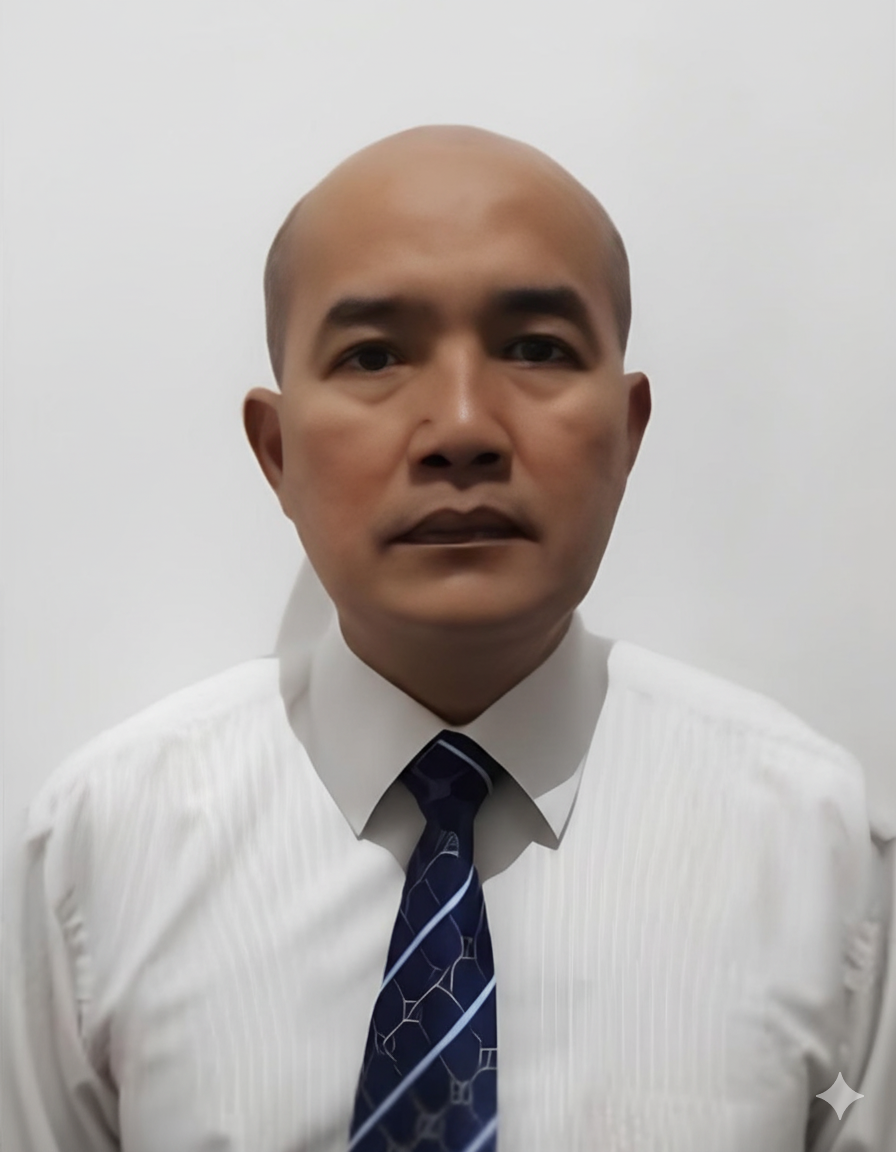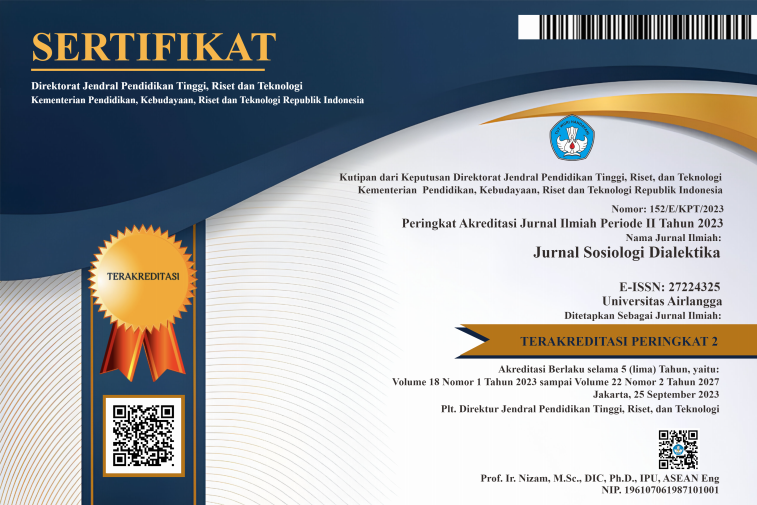Sumane Bewawo Hasi Ritual: A symbolic act respecting the ancestors in South Nias Regency
Downloads
Sumane bewawÓ§ hasi is one of the rituals in the funeral ceremony originating from the Nias Tribe that is engaged in by the people in Ó§ri To'ene, Ó§ri MazinÓ§, and Ó§ri Onolalu in South Nias. This study aimed to determine the symbolic meaning of each of the series of rituals to do with the giving of sumane bewawÓ§ hasi. This study used a qualitative descriptive research method and symbolic interaction theory. The data collection in this study consisted of interviews, observations, and documentation techniques. Furthermore, the data analysis used data reduction, data analysis, and drawing conclusions. The result of this research shows that sumane bewawÓ§ hasi is a symbolic act that specifically aims to pay homage to the parents or ancestors as a symbol of separation. It can also involve famolakhÓ§mi ya'ira sofulo (glory/dignity of the community) and appreciation of the people attending the funeral. This ritual also aims to strengthen the kinship in the family (fahasara dÓ§dÓ§ si fatifusÓ§) as a form of togetherness, celebrating the involvement of the entire extended family in the implementation of the religious and familial events. The implementation process consists of several stages: orahua sifatalifusÓ§, fame'e sumane and the implementation of hÓ§lihÓ§li Sumane.
Aksoz-Efe I, Erdur-Baker O & Servaty-Seib H (2018) Death rituals, religious beliefs, and grief of Turkish women. Death Studies 42 (9): 579-592.
Alexander JC (2006) Social Performance: Symbolic Action, Cultural Pragmatics, and Ritual. Cambridge: University Press.
Burkert W (1983) Homo Necans: The Anthropology of Ancient Greek Sacrificial Ritual and Myth. Berkeley: University of California Press.
Covarrubias M (2013) Pulau Bali: Temuan yang Menakjubkan. Denpasar: Udayana University Press.
Creswell JW (2016) Reseacrh Design: Pendekatan Metode Kualitatif, Kuantitatif, dan Campuran. Yogyakarta: Pustaka Pelajar.
Durkheim E (2011) The Elementary Forms of the Religious Life. Yogyakarta: IRCiSoD.
Elbadiansyah U (2014) Interaksionisme Simbolik dari Era Klasik hingga Modern. Jakarta: Rajawali Press.
Goodman GR (2004) Teori Sosiologi Modern. Jakarta: Kencana.
Hummel TT (2015) Salib dan Adu: Studi Sejarah dan Sosial-Budaya tentang Perjumaan Kekristenan dan Kebudayaan Asli di Nias dan Pulau-pulau Batu, Indonesia (1865-1965). Jakarta: BPK-Gunung Mulia.
Ismail R (2019) Ritual kematian dalam agama asli Toraja "Aluk To Dolo” (studi atas upacara kematian Rambu Solok). RELIGI: Jurnal Study Agama-Agama 15 (1):1-20.
Jones P (2010) Pengantar Teori-Teori Sosial: Dari Fungsionalisme hingga Post-Modernisme. Jakarta: Yayasan Pustaka Obor Indonesia.
Lase A (2017) Kabar Nias. [Accesed 10 February 2021]. https://kabarnias.com/budaya/adat-istiadat/simbi-tanda-penghormatan-tulus-orang-nias-8523.
LÓ§mbu CS (2019) Ruang ketiga dalam identitas baru Nias Padang Kristen. Thesis, Universitas Kristen Satya Wacana, Salatiga.
Maru'ao N (2014) Analisis penyebab menurunnya penerapan Fangowai Dan Fame'e Afo dalam pesta adat perkawinan di Kecamatan Lotu Kabupaten Nias Utara: Kajian sosiolinguistik. Thesis, Universitas Muslim Nusantara Al Washliyah, Medan.
Mead GH (1934). Mind, Self, and Society: From the Standpoint of a Social Behaviorist. London: The University Of Chicago Press.
Patty FN (2014) Memahami teori ritual Catherine Bell dan fungsinya bagi studi teologi (Hermeneutis). Gema Teologi 38 (2):225-236.
Prayitno FO (2020) The development of the Mangongkal Holi Batak Toba indigenous ritual in Christianity in the Batak land. Anthropos: Jurnal Antropologi Sosial dan Budaya 6 (1):84-92.
Putri AS (2020) Makna upacara adat pemakaman Rambu Solo' di Tana Toraja. Jurnal Kreasi Seni dan Budaya 3 (1):72-81.
Raodah (2015) Simbolical meaning of Mappaoli Banua tradition in Banua Kaiyang Mosso society of West Sulawesi . Patanjala 7 (3):365-380.
Rema N (2014) Tradisi pemujaan leluhur pada masyarakat Hindu di Bali. Forum Arkeologi 27 (1):1-12.
Sitinjak PT (2018) Mangongkal Holi sebagai tindakan simbolik kekerabatan Batak Kristen Diaspora. Thesis, Universitas Kristen Satya Wacana, Salatiga.
Soeprapto R (2002) Interasionisme Simbolik: Perspektif Sosiologi Modern. Malang: Averroes Press.
Sugiyono (2013) Metode Penelitian Kuantitatif, Kualitatif dan R&D. Bandung: Alfabeta.
Titaley YP (2021) Ancestors worship based on timorese perspectives in Oelbubuk Village, Central Mollo Sub-District, Timor Tengah Selatan District. International Journal of Entrepreneurship and Business Development 4 (1):1-6.
Turner V (1969) The Ritual Process: Structure and Anti-Structure. New York: Cornel University Press.
Turner V (1975) Revelation and Divination in Ndembu Ritual: Symbol, Myth, and Ritual. London: Cornell University Press.
Warneck J (2001) Kamus Batak Toba-Indonesia. Medan: Bina Media.
Winangun YW (1990) Masyarakat Bebas Struktur: Liminalitas dari Komunitas Menurut Victor Turner. Yogyakarta: Kanisius.
Wiradnyana K (2010) Legitimasi Kekuasaan Pada Budaya Nias: Panduan Penelitian Akeologi dan Antropologi. Jakarta: Obor.
Yusuf AM (2004) Metode Penelitian: Kuantitatif, Kualitatif dan Penelitian Gabungan. Jakarta: Kencana.
Copyright (c) 2021 Jurnal Sosiologi Dialektika

This work is licensed under a Creative Commons Attribution-NonCommercial-ShareAlike 4.0 International License.
1. Copyright of this journal is possession of Editorial Board and Journal Manager, by the knowledge of author, whilst the moral right of the publication belongs to the author.
2. Legal formal aspect of journal publication accessibility refers to Creative Commons Attribution-NonCommercial-ShareAlike (CC BY-NC-SA), implies that publication can be used for non-commercial purposes in its original form (cannot be modified).
3. Every publications (printed/electronic) are open access for educational purposes, research, and library. Other that the aims mentioned above, editorial board is not responsible for copyright violation.















